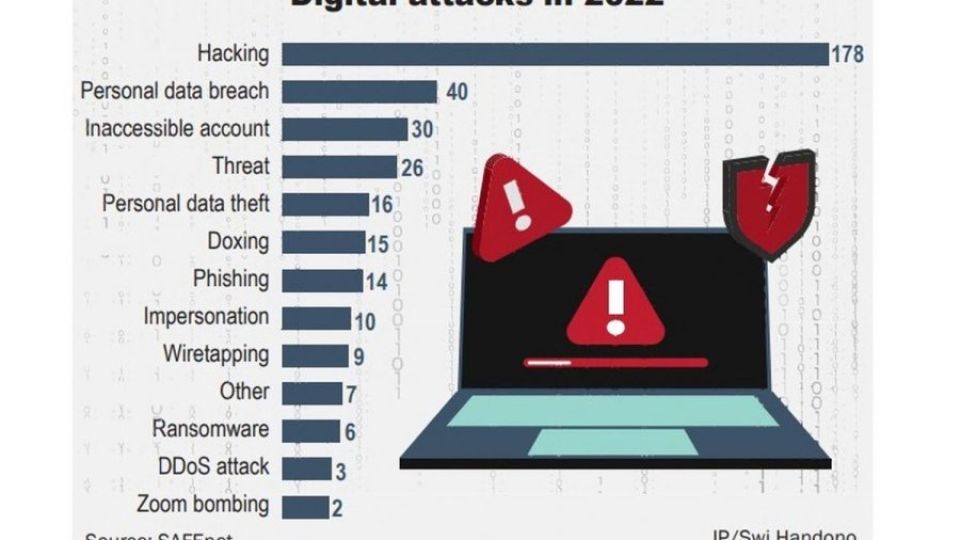March 1, 2023
JAKARTA – Digital freedom of expression will suffer further in the lead-up to the 2024 general elections, one watchdog’s study on cyberattacks has predicted, as the nation enters a period of enhanced competition to capture the hearts and minds of internet-savvy Indonesian voters.
Particularly, the number of cyberattacks against critical voices is bound to be increase this year, according to the latest study by the Southeast Asia Freedom of Expression Network (SAFEnet).
The report found that digital attacks in the country had more than doubled over the past two years, from 147 discrete instances in 2020 to 302 last year, cementing a trend that had grown from the start of Joko “Jokowi” Widodo’s second term.
The attacks targeted at least 130 people, mostly activists, students and journalists, that had criticized the government.
In September 2022, a wave of cyberattacks targeted the website of local media company Narasi TV and the social media accounts of their journalists and employees, including founder and seasoned journalist Najwa Shihab.
The incident occurred after the outlet published coverage of a senior National Police officer’s lavish attire at a one-off press conference on the murder plot involving former police internal affairs chief Ferdy Sambo.
Narasi filed a report with the police over the incident but, as of last month, had not received any information that the police were looking into it, according to local reports.
Earlier in August, at least 10 people were targeted by digital attacks following a wave of online protests against the Communications and Information Ministry’s decision to block access to popular digital service providers that were widely used but had failed to comply with state regulations.
In April, at least 12 students who joined a rally to protest the idea of extending the presidential term limit and postponing the elections faced attempts by unknown assailants to take control of their social media accounts.
In February 2022, the head of the Alliance of Independent Journalists (AJI), Sasmito Madrim, became the target of hackers who took over his WhatsApp account and spread misinformation.
In most instances, it remains unclear who the perpetrators were. However, based on the victims’ backgrounds, it was clear that the cyberattacks were politically motivated and that they were only going increase ahead of voting day, said SAFEnet secretary Anton Muhadjir.
One of his predictions ahead of the 2024 poll was that hackings of social media accounts and electronic devices would remain the most common form of cyberattack, followed by doxing.
“We believe that [digital attacks] will increase, just by looking at the data of the past three years. Digital attacks tend to increase when there are moments of political significance,” he said at the report’s recent launch event.
Anton added that politically motivated attacks against rivals or their supporters were also very likely to occur.
Lacking authority
Meanwhile, authorities have been slow to follow up on cyberattack cases against civilians and state databases.
The National Cyber and Encryption Agency (BSSN) said last week that efforts were underway to mitigate the potential increase in cyberattacks ahead of the 2024 elections, according to a statement issued on a National Police-affiliated news site.
Last year, lawmakers passed the Data Privacy Law, which grants citizens more control over their personal information online and looks to spur cybersecurity improvements amid multiple waves of digital attacks.
But the government has yet to form an oversight agency as mandated by the law, citing the ongoing process of drafting implementing regulations, Kompas daily reported. The agency would be responsible for establishing the details of the nation’s data protection policies.
Shevierra Damadiyah, a member of the Coalition for Personal Data Protection Advocacy, urged the government to create a healthy ecosystem for personal data protection and digital security to prevent data leaks and cyberattacks.
She said civil society should keep tabs on the oversight agency’s establishment in order to ensure its independence.
“The [Data Privacy] Law requires controllers of personal data to guarantee the security of the data they manage,” she told The Jakarta Post on Monday.
‘Alarming’ speech restrictions
The SAFEnet study also found that 2022 was the worst year for freedom of expression in nine years, based on the high number of cases against critics of the government or state institutions.
As many as 97 investigations into online critics involving 107 people were pursued by the police throughout 2022, nearly three times higher than the previous year.
Activists, journalists and students who used digital media to voice their criticism faced the threat of articles in the newly revised Criminal Code and the Electronic Information and Transactions (ITE) Law that curtailed free speech.
House of Representatives Commission I overseeing communications and information is set to deliberate on a planned revision of the ITE Law in its next sitting period beginning next month.
Commission I lawmaker Bobby Adhityo Rizaldi of the Golkar Party has said the deliberations will seek to ensure that the ITE Law is brought in line with the new Criminal Code.


